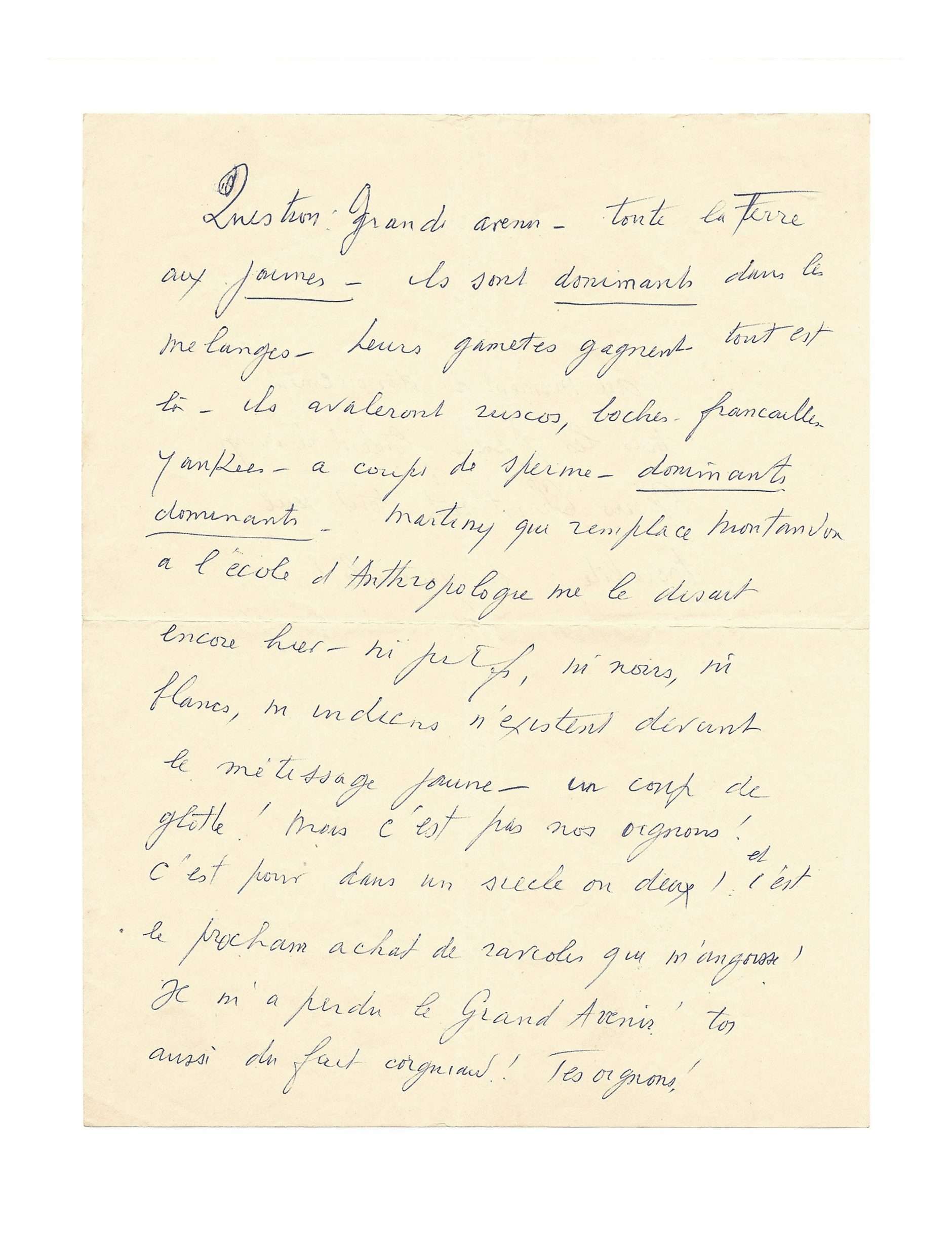CÉLINE, Louis-Ferdinand (1894-1961)
Autograph letter (fragment ?) [to Robert le Vigan]
N.p.n.d [c. 1955], 1 p.1/2 in-4°
« Neither Jews, nor blacks, nor whites, nor Indians exist in the face of yellow miscegenation »
Fact sheet
CÉLINE, Louis-Ferdinand (1894-1961)
Autograph letter (fragment ?) [to Robert le Vigan]
N.p.n.d [c. 1955], 1 p.1/2 in-4°
Tiny tear on fold
Céline anticipates a great replacement of civilizations by the Asian population
« Question Grand avenir – Toute la terre aux jaunes – ils sont dominants dans les mélanges – Leurs gamètes gagnent, tout est là – ils avaleront ruskos, boches, francailles, yankees – à coups de sperme – dominants dominants. Martiny qui remplace Montandon à l’école d’anthropologie me le disait encire hier – Ni juifs, ni noirs, ni blancs, ni indiens n’existent devant le métissage jaune – un coup de glotte ! Mais c’est pas nos oignons ! C’est pour dans un siècle ou deux ! et c’est le prochain achat de raviolis qui m’angoisse ! Il m’a perdu le Grand Avenir ! Toi aussi au fait, corgniaud ! Tes oignons ! »
[Céline adds on the verso:]
« Au moment du dénouement
Tous les Apôtres foutent le camp
Jésus Christ reste tout seul
Moralité : sa gueule ! »
Céline’s anti-Semitic pamphlets and his intelligence with the enemy during the Second World War earned Céline a conviction during his exile in Denmark. Later, he did not hide, like this letter, from affirming his convictions and theories (under cover of the words of the Doctor of Medicine Marcel Martiny) to his relatives and confidants. Here, the writer violently attacks the Asian people, a new target, while adding a touch of humour of his own.
Céline’s companion on the run in Germany, the actor Robert le Vigan (1900-1972) was a film star of the 30s and 40s. He found success in films such as Julien Duvivier’s Golgotha in 1935, where he played Christ. He also made a name for himself in Jean Renoir’s Les bas-fonds in 1936. Close to Arletty and Gen Paul, the latter introduced him to Céline around 1935, with whom he became friends, living like him in Montmartre. He had bought a cat from La Samaritaine, but had to part with it when he divorced his wife in 1943. It was Céline who adopted the animal, renaming it Bébert, which was very often mentioned in his prison correspondence. Robert Le Vigan compromised himself during the Occupation by participating in the broadcasts of Radio-Paris, and, after the Allied landings in Normandy, barricaded himself at home, before fleeing to Baden-Baden in August 1944: he met Céline there and then followed him through Germany, to Kränzlin near Berlin and then to Sigmaringen, where he aggravated his case by reading there the daily bulletin of the collaborating radio Ici la France.
Falling out with Céline, he did not follow him to Denmark and tried to flee to Austria but was arrested by the Americans and repatriated to France. Imprisoned in Fresnes, he was sentenced in November 1946, among other things, to 10 years of hard labour, but due to illness, he was released in October 1948. He then went into exile in Spain before going to Argentina where he remained until his death.
Having refused at his trial to follow the injunctions to charge Céline, the latter reciprocated all his friendship: while in the first versions of his novel Féerie pour une autre fois II (Normance), retracing his last days in Paris and his escape, Céline had described Le Vigan in a ferocious way in the guise of the character “Norbert”, He then decided to delete the insulting passages and write others that were more rewarding. In the Germanic trilogy that followed, in which Le Vigan appears this time under the name of “La Vigue”, Céline did not retain the same benevolence, and, notably in Nord, made a literary portrait of him as a deranged man, a living image of a world out of whack.
Marcel Martiny (1897-1982), quoted here, who replaced George Montandon (1879-1944) was a Doctor of Medicine (Paris, 1925), and worked as a serologist in the laboratories of Alexis Carrel during the Great War. After practising dispensary medicine, he became deputy chief physician at the Léopold-Bellan Hospital (1933-1944), where he practiced acupuncture. A professor at the School of Anthropology, he became a specialist in “human biotypology.” Having gone into exile in Baden-Baden at the same time as Céline, he changed his mind and returned to France where he was not disturbed. It is mentioned in the Prison Notebooks: “Martiny is coming. It’s complicated… sneaky […] Martini betrayed me, he left one morning with the cures. Great friend of Councillor Schlemann… (R4, p. 571). After the Second World War, as chief physician at the Foch Hospital, Martiny published numerous works, including an Essay on Human Biotypology (1948), and taught at the School of Anthropology.
Is this document a fragment of a letter or a first draft? We know a part of the text that remains, but the words “You too, by the way, Corgniaud! Your onions! ” that we find at the end of our document seem to be added to another sentence in another, more complete known transcript. The verso, where the writer’s astonishing postscript appears, leaves little doubt as to its addressee, who had distinguished himself in Golgotha in 1935 (see above).
Provenance:
Patrice Campesato’s estate
Bibliography:
Le Monde, 15 février 1969, n°7494, Enfer et gloire de L.F Céline, Henri Janière, p. V, col. 3 (b)
Tout CÉLINE 4,Liège, 1987, « inédite » p. 143-144, n°16 – Bulletin célinien n°235



